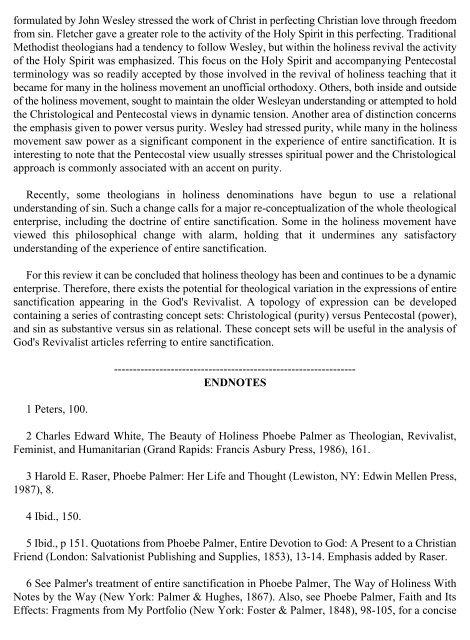A Presentation of Perfection - Media Sabda Org
A Presentation of Perfection - Media Sabda Org
A Presentation of Perfection - Media Sabda Org
You also want an ePaper? Increase the reach of your titles
YUMPU automatically turns print PDFs into web optimized ePapers that Google loves.
formulated by John Wesley stressed the work <strong>of</strong> Christ in perfecting Christian love through freedom<br />
from sin. Fletcher gave a greater role to the activity <strong>of</strong> the Holy Spirit in this perfecting. Traditional<br />
Methodist theologians had a tendency to follow Wesley, but within the holiness revival the activity<br />
<strong>of</strong> the Holy Spirit was emphasized. This focus on the Holy Spirit and accompanying Pentecostal<br />
terminology was so readily accepted by those involved in the revival <strong>of</strong> holiness teaching that it<br />
became for many in the holiness movement an un<strong>of</strong>ficial orthodoxy. Others, both inside and outside<br />
<strong>of</strong> the holiness movement, sought to maintain the older Wesleyan understanding or attempted to hold<br />
the Christological and Pentecostal views in dynamic tension. Another area <strong>of</strong> distinction concerns<br />
the emphasis given to power versus purity. Wesley had stressed purity, while many in the holiness<br />
movement saw power as a significant component in the experience <strong>of</strong> entire sanctification. It is<br />
interesting to note that the Pentecostal view usually stresses spiritual power and the Christological<br />
approach is commonly associated with an accent on purity.<br />
Recently, some theologians in holiness denominations have begun to use a relational<br />
understanding <strong>of</strong> sin. Such a change calls for a major re-conceptualization <strong>of</strong> the whole theological<br />
enterprise, including the doctrine <strong>of</strong> entire sanctification. Some in the holiness movement have<br />
viewed this philosophical change with alarm, holding that it undermines any satisfactory<br />
understanding <strong>of</strong> the experience <strong>of</strong> entire sanctification.<br />
For this review it can be concluded that holiness theology has been and continues to be a dynamic<br />
enterprise. Therefore, there exists the potential for theological variation in the expressions <strong>of</strong> entire<br />
sanctification appearing in the God's Revivalist. A topology <strong>of</strong> expression can be developed<br />
containing a series <strong>of</strong> contrasting concept sets: Christological (purity) versus Pentecostal (power),<br />
and sin as substantive versus sin as relational. These concept sets will be useful in the analysis <strong>of</strong><br />
God's Revivalist articles referring to entire sanctification.<br />
1 Peters, 100.<br />
----------------------------------------------------------------<br />
ENDNOTES<br />
2 Charles Edward White, The Beauty <strong>of</strong> Holiness Phoebe Palmer as Theologian, Revivalist,<br />
Feminist, and Humanitarian (Grand Rapids: Francis Asbury Press, 1986), 161.<br />
3 Harold E. Raser, Phoebe Palmer: Her Life and Thought (Lewiston, NY: Edwin Mellen Press,<br />
1987), 8.<br />
4 Ibid., 150.<br />
5 Ibid., p 151. Quotations from Phoebe Palmer, Entire Devotion to God: A Present to a Christian<br />
Friend (London: Salvationist Publishing and Supplies, 1853), 13-14. Emphasis added by Raser.<br />
6 See Palmer's treatment <strong>of</strong> entire sanctification in Phoebe Palmer, The Way <strong>of</strong> Holiness With<br />
Notes by the Way (New York: Palmer & Hughes, 1867). Also, see Phoebe Palmer, Faith and Its<br />
Effects: Fragments from My Portfolio (New York: Foster & Palmer, 1848), 98-105, for a concise
















